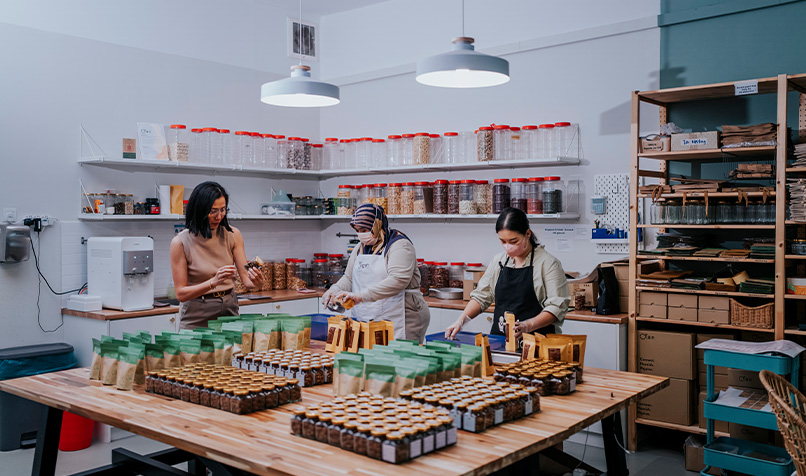Loading component...
At a glance
When entrepreneurs Sean Grealy and Roy Head were developing the blueprint for a new business venture, their spotlight shone on solving the pain points of potential clients. That focus gave rise to Sell Anything, a B2B sales-accelerator enterprise that helps Australian startups navigate early-stage commercialisation of up to A$5 million in revenue.
Grealy says that businesses built around a real problem and addressing a clear need, typically have a stronger foundation than those started on the whim of someone “wanting to be an entrepreneur”.
“It is important to have a clear purpose and a deep understanding of your customers,” he says.
“The first step for anyone with a business idea should be to talk to the people they believe have the problem they’re looking to solve. Otherwise, they’ll build something for no one.”
Data from the Australian Bureau of Statistics reiterates this point, revealing that roughly half of Australian businesses established in the 2020–21 financial year had exited by June 2024. (It is important to note that a business exit does not necessarily indicate failure.
The term encompasses a range of scenarios including businesses that have closed, been sold, undergone a restructure, ceased operations in Australia or have merged.)
Starting a business with the right intent

Launching a business is an exciting prospect — a chance to shape your future and perhaps change the world. In the TikTok era, however, many entrepreneurs enter the game with a romantic notion of pursuing quick riches and a better work-life balance.
CPA Australia’s Asia-Pacific Small Business Survey 2024–25 shows the most popular motivation for small business owners starting a business is being their own boss, followed by work-life balance and pursuing a passion or personal interest.
In Kuala Lumpur, Huay Ping Seet CPA has no regrets about giving up high-paying jobs to set up Origin Bulk Store seven years ago. The ecommerce business follows zero waste principles and provides a sustainable alternative for buying health food and gifts, both to her community and prestigious hotels.
"My biggest piece of advice for young people when starting a business is that hoping to ‘get rich quickly’ cannot be the primary purpose. If it is your main motivation, you won’t last more than two years."
Seet understands the desire to be your own boss, saying she wanted to “be the captain and have more control” over her day-to-day work. Most importantly, however, she wanted to run a business that aligned with her personal beliefs and lived up to her motto: “Better earth, better you”.
“That’s how we distinguish our business from other brands,” Seet says.
Despite her success, Seet says that starting from scratch is never easy. She has taken a pay cut since leaving the finance and accounting world, and she no longer has a large administrative team at her side. She is happy, though.
“My biggest piece of advice for young people starting a business is that hoping to ‘get rich quickly’ cannot be the primary purpose. If it is your main motivation, you won’t last more than two years.”
Focus on customer value in business startups
Identifying a gap in the market or having the smarts to adjust if a business idea is struggling, takes application and courage.
In 2016, Kristy Valentine, a former McDonald’s executive, set up her own Sydney-based business Dr Dough Donuts. She admits, however, that her first iteration of the enterprise did not hit the mark.
“We quickly realised that people were coming into the café to buy six, 10 or 12 donuts at a time for birthdays or gifts,” Valentine says. So, she switched from selling the donuts exclusively through her own cafe to selling colourful and extravagant donut gift boxes online to customers who wanted to treat or reward their friends, family or work colleagues.
"You have to wear many, many hats. Had I known about that in the beginning, it probably would have scared me. I don’t know if I would have moved forward."
“You have to be flexible and change according to what customers want and how they use the product,” she says.
In the early days of the business, Valentine lived in a modest unit, skipped a salary and acquired a taste for two-minute noodles. Later, when Dr Dough Donuts extended sales into petrol stations and convenience stores, this changed.
Clearly, the business pivots have paid off, with Valentine recently selling the business — which sells about 3000 donuts a day — to food manufacturer Bob & Pete’s for an undisclosed sum.
Improve the chance of long-term success
Reflecting on lessons learnt, Valentine advises other entrepreneurs to set up financial controls properly from day one via a CFO, or internal or external accountants, to be well placed to potentially one day sell the business.
For his part, Grealy says new business owners must have grit and be prepared to back their own idea with their own money. He committed about A$40,000 to getting Sell Anything off the ground, with no guarantee of success.
“That takes a lot of conviction,” he says. “I don’t recommend entrepreneurship for people if they’re not willing to back themselves and believe in their mission and purpose.”
He also endorses the Lean Startup method of “build, measure and learn” as part of a feedback loop that allows a business to continually refine a product or service idea.
To improve the chances of long-term success, Seet encourages entrepreneurs to regularly meet other industry players and align personal values and passions with the project.
“Your network equals your net worth,” she says.
The reality of work-life balance for entrepreneurs
When vision, belief, commitment and hard work exist in a business, the personal and financial rewards are more likely to follow.
Valentine says the reality is that most founders work more, not less, than they did in traditional jobs, particularly in the startup phase. They also juggle many duties, from marketing, sales and HR to finance and even cleaning — often in the same day.
“You have to wear many, many hats,” she says. “Had I known about that in the beginning, it probably would have scared me. I don’t know if I would have moved forward.”
Today, though, Valentine can reflect on the mental challenges, sacrifices and legalities and know that Dr Dough Donuts has survived and thrived.
As Grealy seeks to continue expanding Sell Anything, he vows to keep talking and listening to his clients every day.
“That’s the number one thing that allows you to continue innovating and coming up with new services.”

